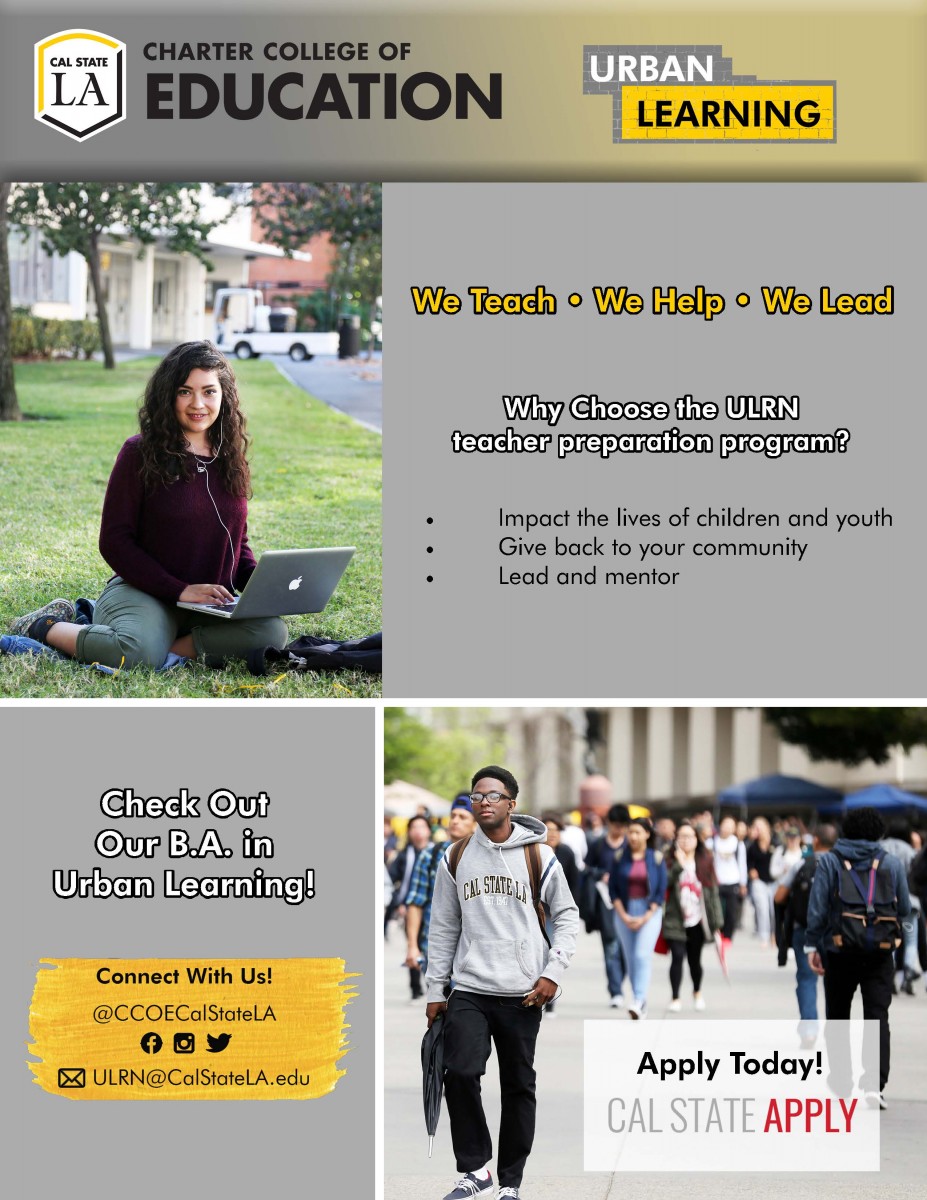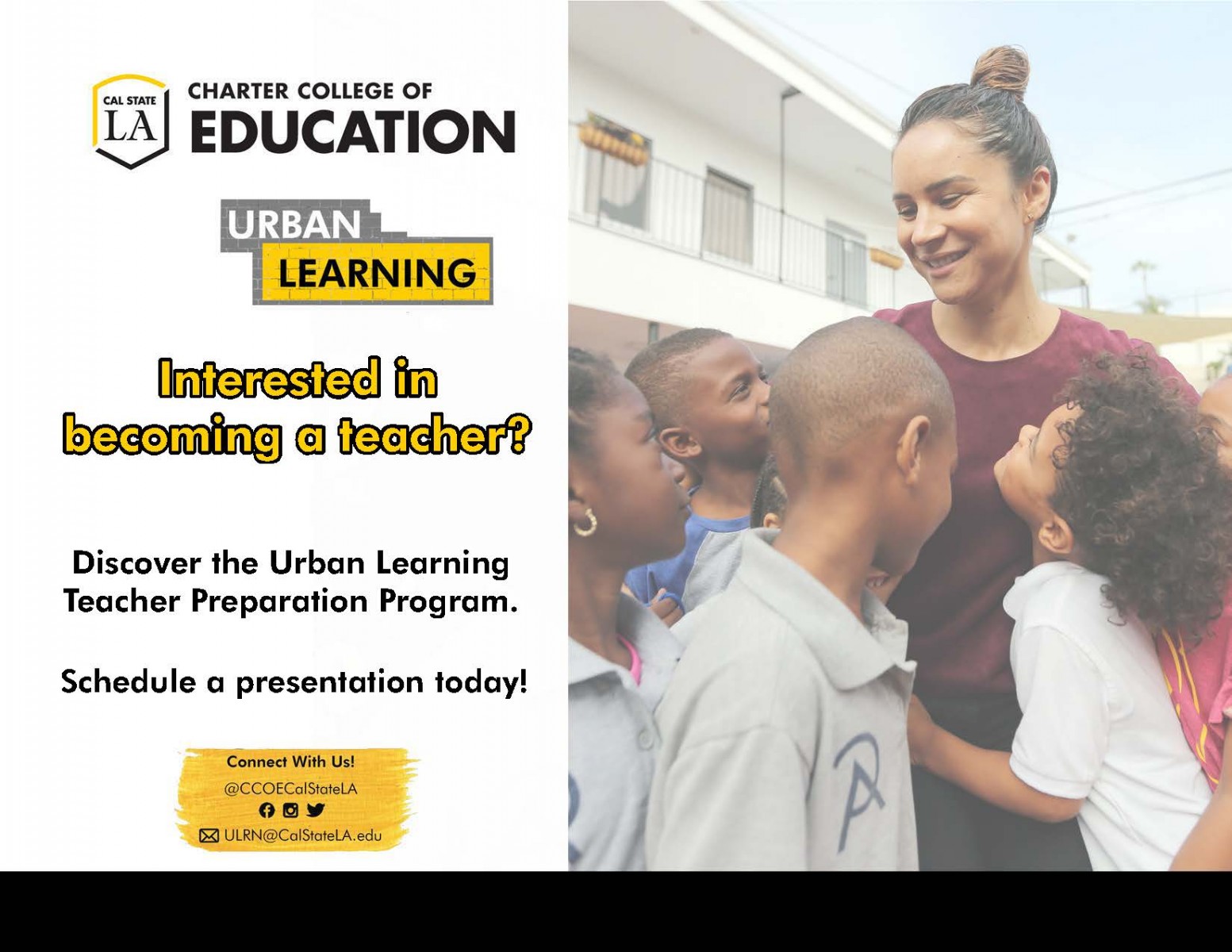Welcome to the Urban Learning Program!
Your Undergraduate Pathway to Becoming a Teacher in California
Are you ready to inspire future generations and make a real difference? In California, becoming a teacher starts with earning a teaching credential—and you don’t have to wait until after college to begin! The Bachelor of Arts in Urban Learning program is an Integrated Elementary Subject Matter Preparation Program that helps you earn both your bachelor’s degree and Preliminary teaching credential in just four years. With flexible options, you can choose the path that aligns with your teaching goals.
Why Choose the Urban Learning ITEP Program?
The Urban Learning Program prepares culturally relevant and sustaining, transformative educators who seek to inspire wonder and critical consciousness in their students. The program and its faculty develop educators grounded in Culturally Relevant and Sustaining Pedagogies, Restorative Practices, Learning as Situated Practice, and Transformative, Socially Just Education.
Plus, you can select one of these options to match your career goals:
Prepares you to teach in general education elementary classrooms.
List of Required Courses:
| Semester 1 | EDCI 4000 Transformative Teaching in Diverse Urban Classrooms (3) EDCI 4010 or EDCI 4011 or EDSP 4010 (3) EDSP 4000 Foundations of Special Education (3) |
|---|---|
| Semester 2 | EDEL 4020 Introduction to Instructional Design, Assessment & Classroom Management Methods (3) EDFN 4131 Introduction to Psychological Foundations of Education (3) EDEL 4150 Curriculum and Teaching of Reading and Language Arts (3) EDEL 4170 Curriculum and Teaching of Elementary Mathematics (3) |
| Semester 3 | EDEL 4180 Curriculum and Teaching of Elementary School Science (3) EDEL 4160 Curriculum and Teaching of Writing and Language Arts (3) EDEL 4190 Curriculum and Transformative Teaching of Social Science (3) EDCI 4550 edTPA (3)* |
| Semester 4 | EDEL 4880 Directed Teaching: Multiple Subject (7) OR EDEL 4890 Demonstration of Instructional Competencies (7) EDEL 4881 Reflection, Synthesis and Assessment of Directed Teaching (3) EDCI 4560 edTPA (3)* |
*Not a required course, but strongly recommended for EdTPA support
Equips you to teach in bilingual settings (Spanish) in elementary classrooms.
Prerequisite: Fluency in Spanish, as evaluated by the Bilingual Authorization.
List of Required Courses
| Semester 1 | EDCI 4000 Transformative Teaching in Diverse Urban Classrooms (3) EDCI 4010 or EDSP 4010 (3) EDSP 4000 Foundations of Special Education (3) |
|---|---|
| Semester 2 | EDEL 4020 Introduction to Instructional Design, Assessment & Classroom Management Methods (3) EDFN 4131 Introduction to Psychological Foundations of Education (3) EDEL 4150S Curriculum and Teaching of Reading and Language Arts (3) EDEL 4170 or EDEL 4170S Curriculum and Teaching of Elementary Mathematics (3) |
| Semester 3 | EDEL 4180 or EDEL 4180S Curriculum and Teaching of Elementary School Science (3) EDEL 4160S Curriculum and Teaching of Writing and Language Arts (3) EDEL 4190 or EDEL 4190S Curriculum and Transformative Teaching of Social Science (3) EDCI 4550 edTPA (3)* |
| Semester 4 | EDEL 4880 Directed Teaching: Multiple Subject (7) OR EDEL 4890 Demonstration of Instructional Competencies (7) EDEL 4881 Reflection, Synthesis and Assessment of Directed Teaching (3) EDCI 4560 edTPA (3)* |
*Not a required course, but strongly recommended for EdTPA support
Focuses on teaching students with diverse learning needs in grades K–12, transitional kindergarten, and in classes organized primarily for adults through age 22. Students will the option to earn the Educational Specialist teaching credential in Early Childhood Special Education, Mild Moderate Support Needs, Extensive Support Needs, or Visual Impairment.
Mild Moderate Support Needs Program List of Required Courses:
| Semester 1 | EDCI 4000 Transformative Teaching in Diverse Urban Classrooms (3) EDCI 4010 or EDSP 4010 (3) EDSP 4000 Foundations of Special Education (3) |
|---|---|
| Semester 2 | EDSP 4020 Assessment and Educational Planning for Students with Disabilities (3) EDSP 4030 Behavior Supports, Social Skills, and Classroom Management (3) |
| Semester 3 | EDSP 4061 Early Fieldwork in Inclusive Teaching (4) EDSP 4069 Early Fieldwork Seminar: Mild to Moderate Extensive Support Needs (3) * EDSP 4630 Augmentative and Alternative Communication in Special Education (3) |
| Semester 4 | EDSP 4252 Instructional Planning and Delivery for Students with Mild/Moderate Disabilities (3) EDSP 4253 Instruction, Assessment, and Curricular Supports in Mathematics, Science and Social Studies Mild/Moderate Disabilities (3) EDSP 4257 Advanced Study of Literacy Problems & Specialized Interventions for Students with Mild/Moderate Disabilities (3) |
| Post Bacc | EDSP 4091 Final Directed Teaching in Approved Candidate Teaching Assignment: Mild/Moderate Disabilities or EDSP 4071 Student Teaching (9) EDSP 4099 - Final Directed Teaching Seminar: Mild to Moderate and Extensive Support Needs (3) ** CalTPA Exam |
*Not a required course, but strongly recommended
** Link to the Commission on Teacher Credentialing website for CalTPA information
https://www.ctcexams.nesinc.com/TestView.aspx?f=HTML_FRAG/CalTPA_TestPage.html
| Prerequisites to the Intern Program | EDSP 4000 Foundations of Special Education (3) EDSP 4001 Observations in Urban Classrooms (1) EDSP 4010 Cognitive, Linguistic, and Literacy Processes in Individuals with Special Needs (3) |
|---|---|
| Semester 1 | EDSP 4020 Assessment and Educational Planning for Students with Disabilities (3) EDSP 4030 Behavior Supports, Social Skills, and Classroom Management (3) EDSP 4050 Instruction to Support Students with Disabilities in Core/English Language Arts (3) *EDSP 4950 Intern Supervision Seminar (2) |
| Semester 2 | EDSP 4061 Early Fieldwork in Inclusive Teaching (4) EDSP 4069 Early Fieldwork Seminar: Mild to Moderate Extensive Support Needs (3) EDSP 4630 Augmentative and Alternative Communication in Special Education (3) ** CalTPA Exam |
| Semester 3 | EDSP 4252 Instructional Planning and Delivery for Students with Mild/Moderate Disabilities (3) EDSP 4253 Instruction, Assessment, and Curricular Supports in Mathematics, Science and Social Studies Mild/Moderate Disabilities (3) EDSP 4257 Advanced Study of Literacy Problems & Specialized Interventions for Students with Mild/Moderate Disabilities (3) *EDSP 4950 Intern Supervision Seminar (2) |
| Semester 4 | EDSP 4091 Final Directed Teaching in Approved Candidate Teaching Assignment: Mild/Moderate Disabilities or EDSP 4071 Student Teaching (9) EDSP 4099 - Final Directed Teaching Seminar: Mild to Moderate and Extensive Support Needs (3) ** CalTPA Exam |
*Not a required course, but strongly recommended
** Link to the Commission on Teacher Credentialing website for CalTPA information
https://www.ctcexams.nesinc.com/TestView.aspx?f=HTML_FRAG/CalTPA_TestPage.html
Early Childhood Program List of Required Courses:
| Semester 1 | EDSP 4000 Foundations of Special Education (3) EDSP 4001 Observations in Urban Classrooms (1) EDSP 4010 Cognitive, Linguistic, and Literacy Processes in Individuals with Special Needs (3) EDSP 4030 Behavior Supports, Social Skills, and Classroom Management (3) EDSP 4670 Low Incidence Early Childhood Special Education (2) |
|---|---|
| Semester 2 | EDSP 4170 Advanced Issues in Early Childhood Special Education (3) EDSP 4141 Early Childhood Special Education Intervention Lab (6) EDSP 4142 Early Childhood Special Education Intervention Seminar (3) |
| Semester 3 | EDSP 4630 Augmentative and Alternative Communication in Special Education (3) EDSP 4140 Assessment and Evaluation in Early Childhood Special Education (3) EDSP 4160 Working with Families of Young Children with Special Needs (3) EDSP 4065 Student Teaching with Master Teacher in Early Intervention (Birth-3) (4) |
| Semester 4 | EDSP 4075 or 4095 Student Teaching with a Master Teacher in Preschool Special Education (9) EDSP 4180 Evidence-Based Practices in Early Literacy for Young Children with Disabilities (3) |
Extensive Support Needs Program List of Required Courses:
| Prerequisites to the Intern Program | EDSP 4000 Foundations of Special Education (3) EDSP 4001 Observations in Urban Classrooms (1) EDSP 4010 Cognitive, Linguistic, and Literacy Processes in Individuals with Special Needs (3) |
|---|---|
| Semester 1 | EDSP 4020 Assessment and Educational Planning for Students with Disabilities (3) EDSP 4030 Behavior Supports, Social Skills, and Classroom Management (3) EDSP 4050 Instruction to Support Students with Disabilities in Core/English Language Arts (3) EDSP 4301 Learning Needs and Collaborative Supports: Students with Extensive Support Needs (3) *EDSP 4950 Intern Supervision Seminar (2) |
| Semester 2 | EDSP 4062 Early Fieldwork in Inclusive Teaching (4) or EDSP 4082 (4) EDSP 4069 Early Fieldwork Seminar: Mild to Moderate and Extensive Support Needs (3) ** CalTPA Exam |
| Semester 3 | EDSP 4302 Assessment and Instructional Adaptations: Students with Extensive Support Needs (3) EDSP 4303 Social Competence and Functional Skills: Students with Extensive Support Needs (3) EDSP 4630 Augmentative and Alternative Communication in Special Education (3) * EDSP 4950 Intern Supervision Seminar (2) |
| Semester 4 | EDSP 4072 Final Directed Teaching with a Master Teacher: Extensive Support Needs (9) or EDSP 4092 – Demonstration of Instructional Competencies in Moderate/Severe Disabilities (9) EDSP 4099 Final Directed Teaching Seminar: Mild to Moderate and Extensive Support Needs (3) ** CalTPA Exam |
*Not a required course, but strongly recommended
** Link to the Commission on Teacher Credentialing website for CalTPA information
https://www.ctcexams.nesinc.com/TestView.aspx?f=HTML_FRAG/CalTPA_TestPage.html
Visual Impairment and Blindness Program List of Required Courses:
| Prerequisites to the Intern Program | EDSP 4000 Foundations of Special Education (3) EDSP 4001 Observations in Urban Classrooms (1) EDSP 4010 Cognitive, Linguistic, and Literacy Processes in Individuals with Special Needs (3) |
|---|---|
| Semester 1 | EDSP 4050 Instruction to Support Students with Disabilities in Core/English Language Arts (3) EDSP 4650 Medical Aspects of Visual Impairment and Blindness (2) EDSP 4650L Functional Vision Assessment (1) |
| Semester 2 | EDSP 4651L Learning Media Assessment for Students with Visual Impairments (3) EDSP 4652 Specialized Literacy Instruction for Students with Visual Impairments (3) EDSP 4660 Literary Braille Code for Individuals with Visual Impairments (3) *EDSP 4950 Intern Supervision Seminar (2) |
| Semester 3 | EDSP 4661 Advanced Braille Codes for Individuals with Visual Impairments (3) EDSP 4662 Specialized Technology for Individuals with Visual Impairments (3) EDSP 4670 Low Incidence Early Childhood Special Education (2) EDSP 4690 Psychological, Sociological, and Vocational Implications of Visual Impairment and Blindness (2) EDSP 5661 Braille Competency Examination (1) EDSP 5760 Seminar in Visual Impairment and Additional Disabilities (1) |
| Semester 4 | EDSP 5074 - Final Directed Teaching with a Master Teacher: Visual Impairments (9) or EDSP 5094 - Final Directed Teaching in Approved Assignment: Visual Impairments (9) * To be taken if enrolled in the Intern Credential Program |
*Not a required course, but strongly recommended
** Link to the Commission on Teacher Credentialing website for CalTPA information
https://www.ctcexams.nesinc.com/TestView.aspx?f=HTML_FRAG/CalTPA_TestPage.html
Earns you both Multiple Subject and Education Specialist credentials in Mild Moderate Support Needs in an accelerated timeframe.
List of Required Courses:
| Semester 1 | EDCI 4000 Transformative Teaching in Diverse Urban Classrooms (3) EDCI 4010 or EDSP 4010 (3) EDSP 4000 Foundations of Special Education (3) |
|---|---|
| Semester 2 | EDCI 4111 - Curriculum and Teaching of Integrated Literacy and Communication (3) EDCI 4112 - Curriculum and Teaching of STEM Education (3) EDCI 4113 - Curriculum and Teaching of Social Studies, Civic Learning and Humanities (3) EDSP 4020 Assessment and Educational Planning for Students with Disabilities (3) EDSP 4030 Behavior Supports, Social Skills, and Classroom Management (3) |
| Semester 3 | EDSP 4061 Early Fieldwork in Inclusive Teaching (4) EDSP 4069 Early Fieldwork Seminar: Mild to Moderate Extensive Support Needs (3)* EDEL 4455 - Fieldwork in Residency: Multiple Subjects (3) |
| Semester 4 | EDSP 4252 Instructional Planning and Delivery for Students with Mild/Moderate Disabilities (3) EDSP 4257 Advanced Study of Literacy Problems & Specialized Interventions for Students with Mild/Moderate Disabilities (3) EDSP 4455 - Fieldwork in Residency: Mild/Moderate Disabilities |
*Not a required course, but strongly recommended
** Link to the Commission on Teacher Credentialing website for CalTPA information
https://www.ctcexams.nesinc.com/TestView.aspx?f=HTML_FRAG/CalTPA_TestPage.html
Allows you to complete both your Elementary Subject Matter (ESM) and bachelor’s degree without credential. Graduates may pursue careers in education-related fields, educational support services, or teaching assistance. They can also return later to complete their teaching credential.
How to Apply
When you’re ready to apply, look for program name: "Urban Learning – Teacher Preparation" on the application.
Let’s get you started on the path to becoming a teacher and making an impact in the lives of students!
ULRN Program Admissions
Freshmen and transfer students are encouraged to declare a major in Urban Learning (ULRN) upon application to the university and to attend the Cal State LA Orientation program. This will allow us to identify you as a ULRN student early and to provide the best possible advisement.
The major offers students two paths of entry:
- As freshmen. Freshmen complete a program of GE preparation under the supervision of the program before beginning the major course or study. Freshmen should enroll in CCOE 1010 (Introduction to Cal State LA and the College of Education, 3 units) to satisfy the Cal State LA Introduction to Higher Education requirement and seek advisement from ULRN at orientation or during their first semester of enrollment. All freshman students will receive a plan of study toward satisfaction of their GE requirements.
Entering Cal State LA as a Freshman
- As junior transfers from a community college. Transfer students must have a minimum of 60 transferable units, and should request GE or IGETC certification before transferring. Transfer students must complete a short application and have their transcripts reviewed by the program coordinator prior to beginning their course of study, and will enroll in CCOE 3010 (College Success and Professional Preparation, 2 units) their first semester of attendance.
Preparing to Transfer from a Community College
Freshman and transfer students should apply to the ULRN program as soon as they decide to enter the major and have been admitted to Cal State LA. It is not necessary to wait until you enroll at Cal State LA. The earlier you apply the better advisement you will receive and the smoother your transition will be!
To apply to the program, students must:
- Complete a one-page application form
- Write a short essay describing your reasons for becoming a teacher
- Have their transcripts reviewed (transfer students only)
- Apply for a Certificate of Clearance
Please contact the ULRN program at [email protected] to schedule an appointment to apply to the program.
Certificate of Clearance
The California Education Code §44340 & 44341 require that all individuals who seek to obtain California credentials, certificates, permits, and waivers issued by the Commission on Teacher Credentialing receive fingerprint clearance from the California Department of Justice (DOJ) and the Federal Bureau of Investigation (FBI) through the Commission. Individuals who have received fingerprint clearance through other California agencies, employers, other states, or government agencies are not exempt from this process. Certificates of Clearance issued on or after February 28, 2005, are valid for five years. The College of Education requires all students entering the credential program or enrolling in courses that include fieldwork with students to hold a valid Certificate of Clearance before they may register for these courses.
In the Urban Learning Program, students are assigned to a cohort at the beginning of their junior year. Students are not considered officially enrolled in the program until they have applied to the program, are placed in a cohort, and have enrolled in CCOE 1010 or CCOE 3010.
Students
Freshmen entering Cal State LA should seek advisement early and often during their freshman year. Advisement is available from Jesus Arellano at [email protected], and Brian Castillo at [email protected]. Advisement is available to freshmen as soon as they are admitted to Cal State LA, while they are still in high school.
Students majoring in Urban Learning and entering as freshmen will receive a 4-year program plan which will make their progress through the ULRN program easier and ensure they select the courses they need. During their first two years, students entering as freshmen will complete a program of lower division general education (GE) coursework, coursework toward the elementary subject matter (ESM) waiver, and lower division Urban Learning major coursework. During their final two years, students are placed in a ULRN cohort and complete upper-division GE coursework, remaining coursework toward the ESM waiver, and teacher preparation coursework and fieldwork.
Transferring from a Community College?
Interested in Becoming a High School Counselor?
Interested in Becoming a Teacher?
For program information please contact at [email protected]
Urban Learning Program
For questions regarding advisement please contact Jesus Arellano at [email protected].
Our Cohorts
A principal goal of the Urban Learning Program is the development of students’ collaboration and teamwork skills. Each student in the Urban Learning major is assigned to a cohort at the beginning of the junior year. A ULRN cohort is a collegial group of students who take their coursework together while they work and study collaboratively. Cohorts are made up of 20-25 students pursuing the Multiple Subject, Education Specialist, or both credentials. The cohort is a critical academic, social, and professional support system throughout the degree program. Advisement is available from Brian Castillo at [email protected].
The Major and Credential Options
The major program consists of 60 units of lower-division general education preparation, 135 units in the major, and electives appropriate to the student's credential option. Students may earn one or two credentials in the program:
- A Multiple Subject credential, preparing the student to teach children grades K-8 in self-contained classrooms. Students may also add a subject matter authorization to their credential, allowing them to teach subject matter curriculum for grades 7-9.
- An Education Specialist credential prepares the student to teach children with disabilities ranging from birth to grade 12, depending upon the disability option they select. The student may select from among four options: Mild-to-Moderate Disabilities, Moderate-to-Severe Disabilities, Physical and Health Impairments, and Visual Impairment and Blindness.
- The Accelerated Dual Credential Program leads to a Multiple Subject and Education Specialist credential and prepares the candidate to address the learning abilities and needs of a broad range of students in inclusive settings.
Advisor Support

Throughout your journey, your advisors will be there to help keep you on track. Please reach out for any questions.
Jesus Arellano
Phone: (323) 343-4324
Brian Castillo
Phone: (323) 343-6064






